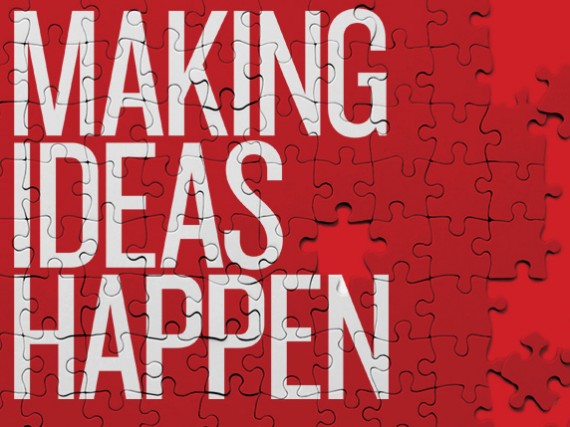Making Ideas Happen
 I recently finished Scott Belsky’s book called Making Ideas Happen: Overcoming the Obstacles Between Vision and Reality. It is a no-nonsense look at how creative people can organize themselves to turn their ideas into reality. As the guy that leads the Creative Arts department at our church, I’m always looking for ways to encourage and lead a team of creative people. I’m surrounded by brilliant artists every day. The problem is that often times the brilliance that is in their heads doesn’t ever see the light of day in a way that would impact those around them and in our larger community. Scott does a great job managing the tension between art and function.
One of the problems with artists is that they often speak their own language. They’ll use phrases like “you wouldn’t understand,” which quickly alienate themselves from others. Sometimes (although fewer than they’d like to admit), this is accurate. Most of the time it is just an excuse for not finding ways to actually implement those ideas or explain them in a concise way that would make sense.
This book doesn’t hold back. For example:
I recently finished Scott Belsky’s book called Making Ideas Happen: Overcoming the Obstacles Between Vision and Reality. It is a no-nonsense look at how creative people can organize themselves to turn their ideas into reality. As the guy that leads the Creative Arts department at our church, I’m always looking for ways to encourage and lead a team of creative people. I’m surrounded by brilliant artists every day. The problem is that often times the brilliance that is in their heads doesn’t ever see the light of day in a way that would impact those around them and in our larger community. Scott does a great job managing the tension between art and function.
One of the problems with artists is that they often speak their own language. They’ll use phrases like “you wouldn’t understand,” which quickly alienate themselves from others. Sometimes (although fewer than they’d like to admit), this is accurate. Most of the time it is just an excuse for not finding ways to actually implement those ideas or explain them in a concise way that would make sense.
This book doesn’t hold back. For example:
While many of us spend too much energy searching for the next great idea, my research shows that we would be better served by developing the capacity to make ideas happen—a capacity that endures over time. The ideas that move industries forward are not the result of tremendous creative insight but rather of masterful stewardship. The way you organize projects, prioritize, and manage your energy is arguably more important than the quality of the ideas you wish to pursue. Someone with average creativity but stellar organizational skills will make a greater impact than the disorganized creative geniuses among us. Perspiration is the best form of differentiation, especially in the creative world. Work ethic alone can single-handedly give your ideas the boost that makes all the difference. Unfortunately, perspiration is not glamorous.The above quotes are broad and useful for a variety of settings where creativity must be implemented. The other area that stood out to me in the book was how Belsky talked about skeptics and cynics. Artists tend to be both, and I loved the way that the book differentiated between the two:
As you cultivate your team’s immune system, you will want to differentiate between skeptics and cynics. Cynics cling to their doubts and are often unwilling to move away from their convictions. By contrast, skeptics are willing to embrace something new—they are just wary and critical at first. Though they are often undervalued, skeptics are an essential component of a healthy team, and leaders should cultivate their respect and influence.By this definition, I’m definitely a skeptic. It also allows me to look for this and foster this in those around me while challenging people who only want to be cynical. If you consider yourself a creative/artist, or work with those who do, this book will give you a handful of tools to work with. I’m adding this to my bookshelf of good books for my team.
Do You Want to Read the Bible Without Falling Behind?
Sign up your email and I’ll send you a PDF to download and use my custom-made reading plan system. There’s no way to fall behind on this system and every day will be different no matter how long you use it!
I’ll send future content directly to your inbox AND you can dive into the Bible like never before.




